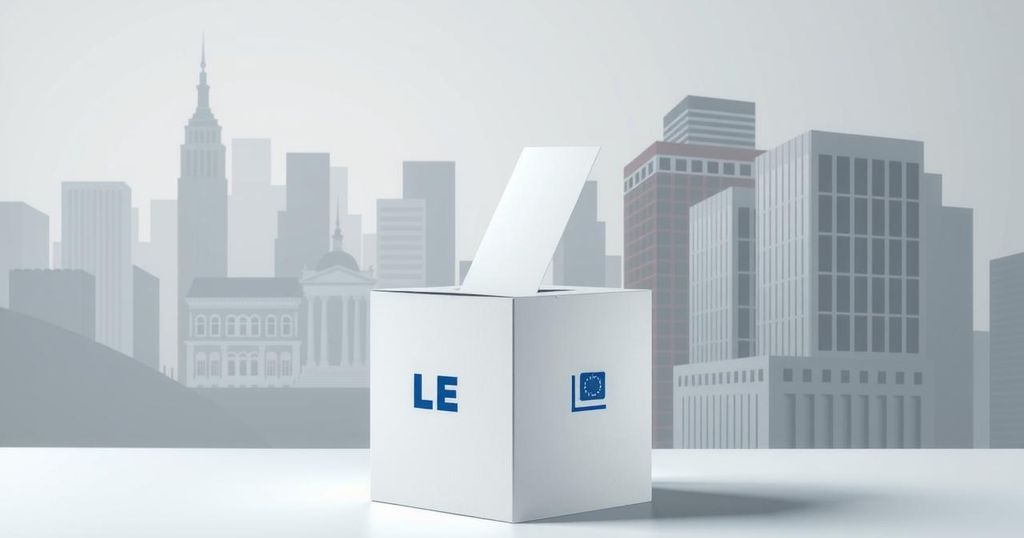Ecuador’s Election: Noboa and Gonzalez in a Tight Race for Presidency

Ecuador’s presidential election resulted in a tight race, with incumbent Daniel Noboa leading slightly over challenger Luisa Gonzalez, prompting a likely run-off. The election reflects opinions on Noboa’s hardline security measures amidst a crime surge. Noboa, backed by a youthful image, faces challenges from Gonzalez, who promises to prioritize citizen welfare and engage with international partners like the IMF. The outcome will shape Ecuador’s future as it battles violence and economic decline.
President Daniel Noboa of Ecuador maintained a slim lead in an election marred by violence, facing a formidable challenge from leftist candidate Luisa Gonzalez. With over 90 percent of votes counted, Noboa secured 44.3 percent while Gonzalez followed closely with 43.8 percent. Gonzalez, a lawyer and single mother, claimed victory by achieving a statistical tie, despite expectations that Noboa could avoid a run-off through a majority win.
The election served as a referendum on Ecuador’s economic performance and Noboa’s stringent security measures amid rising crime rates, including murder and extortion. With drug cartels transforming Ecuador into one of the most dangerous nations, Noboa’s administration has resorted to extraordinary security measures, including states of emergency and military deployment. On election day, soldiers were stationed at polling sites, and borders remained closed to ensure safety.
Despite fears surrounding public safety, only minor incidents related to alcohol bans occurred during the voting process. Supporters of Noboa celebrated in major cities, expressing hope for a change in the country, while Gonzalez’s political ally, former president Rafael Correa, expressed optimism about their chances of victory. At 37, Noboa, one of the world’s youngest leaders, adopted a social media-centric campaign, combining a youthful persona with a tough crime-fighting approach.
Critics highlight that Noboa’s aggressive tactics have escalated human rights issues, while experts warn of the ongoing crisis that has threatened stability since the return to democracy. Meanwhile, Gonzalez affirmed her commitment to maintaining Ecuador’s partnership with the International Monetary Fund to address economic challenges, focusing on support that aids working families rather than alienating them. As Ecuador anticipates an influx of deportees from the United States, Gonzalez emphasized the need to protect its citizens from unjust treatment. Overall, the election highlights the critical issues facing Ecuador, including crime, economic instability, and the treatment of citizens abroad.
In summary, the electoral results indicate a close competition between Noboa and Gonzalez, showcasing deep societal divides and critical challenges facing Ecuador. The impending run-off underscores not only the volatile political landscape but also the pressing necessity for effective governance to address escalating crime and economic crises.
Ecuador has recently faced significant challenges, particularly in terms of rising violence and economic instability. The election involves incumbent President Daniel Noboa, who has adopted a hardline approach to crime, and leftist candidate Luisa Gonzalez, who challenges his policies. The historical context of Ecuador’s transition back to democracy nearly half a century ago plays into the current political landscape, with citizen safety and economic health at the forefront of voter concerns. The role of drug cartels indicates a desperate situation requiring immediate attention to stabilize the nation politically and socially. Human rights concerns have emerged due to aggressive state policies, which leads to debate surrounding the balance of security and civil liberties. The influence of international entities, such as the IMF, is also crucial to Ecuador’s fiscal strategy amidst recession fears. The upcoming election will ultimately serve as a litmus test for public sentiment regarding these complex issues.
Ecuador’s presidential election indicates a divided electorate faced with serious concerns about crime and economic stability. Daniel Noboa’s narrow lead over Luisa Gonzalez highlights a potential run-off that is expected to emphasize the pressing need for effective governance. As both candidates represent differing visions for the country, the election outcome will significantly impact Ecuador’s trajectory amid escalating challenges. Moving forward, the new leader will need to address both security and economic matters to foster stability and restore confidence within the nation.
Original Source: www.kpvi.com







